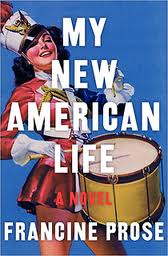by Emma Schneider
“It is difficult not to write a satire” – Juvenal
Lula is a young woman who applies for assistance by lowering the cut of her sweater. She is the not-so-mature nanny of Zeke—a high school senior, whose distinguishing trait is his double-pronged resistance to wearing color and eating vegetables. His depressive Wall Street father, Mr. Stanley, lives the fantasy life of a banker too well-paid to quit his soul-numbing job. Francine Prose’s latest novel of near-realism, My New American Life, chronicles Lula’s attempts to find her niche as an Albanian immigrant in a land of dreams: New Jersey. Watching afternoon television in the suburbs, she waits for the green card that will make her a real American—the sort of American who can drive a car and then pay the speeding ticket without fear of deportation.
After growing up under Communism and a drunken father, Lula believes herself far superior in common sense to any homegrown American. “Paranoia was English for Balkan common sense” after all. Americans aren’t jumpy enough for Lula. Ironically, it is Lula’s considerable lack of responsible action to accompany her “common sense” which drives the novel’s bizarre plot. With the gun of a man she doesn’t know in her underwear drawer, Lula’s story is tauntingly sexualized and marvelously sarcastic. Even as she thinks to herself –What am I DOING?—Lula cannot resist hankering after an elusive Albanian “brother” in a black leather jacket. Lula’s lurid imagination runs for cover, however, when a woman wearing nothing but chocolate and feces appears out of the darkness.
Written as the pseudo-memoir of a chronic liar, My New American Life fudges the line between the probable and the possible with a delightful fun-house mirror take on reality. Though written in the third person limited, Prose’s novel incorporates free indirect discourse to such a degree that any escape from Lula’s clutching perspective is utterly impossible. Lula’s experience isn’t a very normal one (so says common sense), but who’d want to read her story if it was? Confident in her keen perceptions of gullible American men and their oh-so-generous pockets, Lula objectifies the men she believes have over-simplified her. Lula’s naïve interpretation of America—she struggles to detect the nuance between politeness and imbecility—presents a satirical un-fairytale that brings quirky life and a splash of trouble into suburban New Jersey.
While exploring how one broken life can heal another, Prose replaces sap with snark whenever possible. Lula’s value comes not from her own character, but from the way in which her lack of a moral compass gives direction to the lives of those around her. Prose’s satire of a young immigrant settling into the bountiful land of microwave pizzas and watered-down mojitos only occasionally strays from Lula’s self-absorption to investigate a more serious reality, dark with Guantanamo detainees and investment firms that think of “risk management [as] a fancy term for what the lemmings do when they hold hands and jump off a cliff.” Prose slips commentaries on a slew of modern events into the (somewhat disregarded by Lula) comments of the book’s adult males: an immigration lawyer and an investment banker. Through these men, Prose jabs at two of the largest political, economical, and social issues of current times. Happily for Lula, all these gloomy comments are nothing that an overfilled glass of wine can’t wipe away.
In a post-9/11 America, satire flows like simple syrup. Such brooding and misguided times lend themselves to comedic commentary. The more bitter the times, the better the satire. With a hefty dollop of wit and just a hint of heart, My New American Life offers a crunchy first bite into summer reading.
This post may contain affiliate links.









